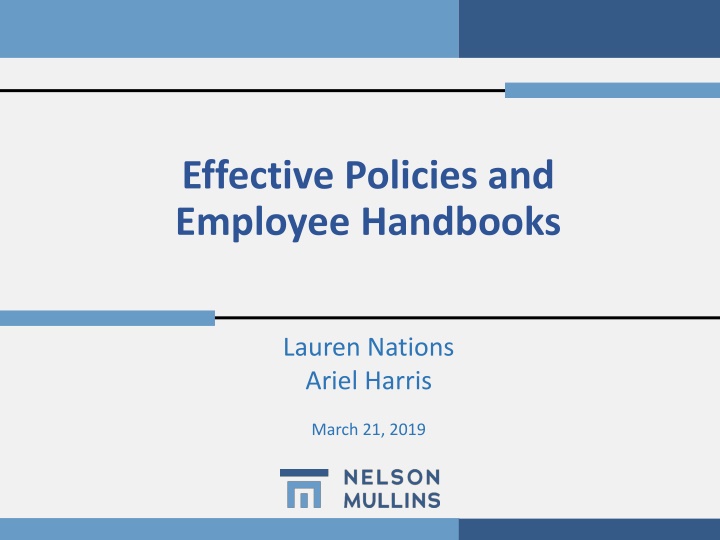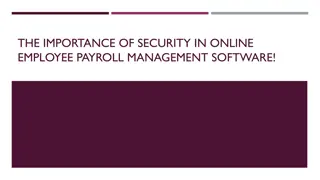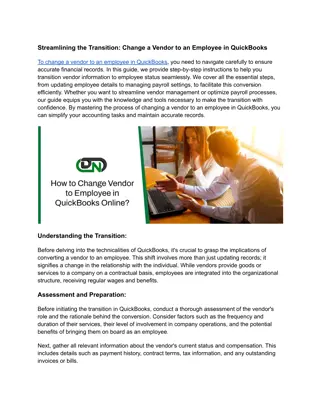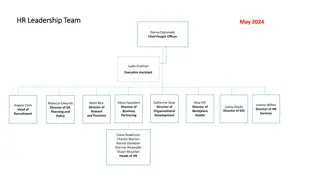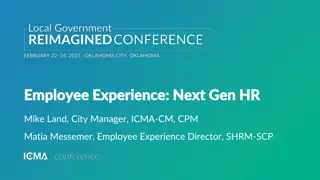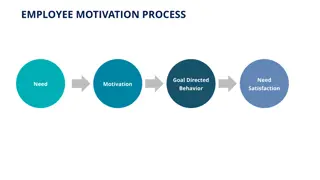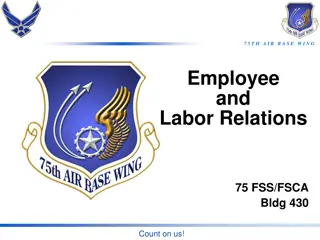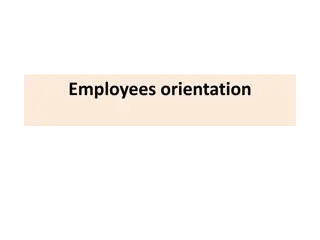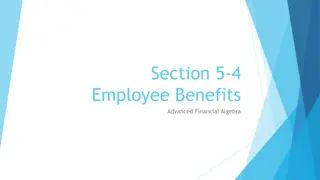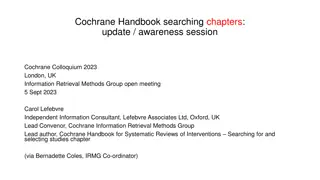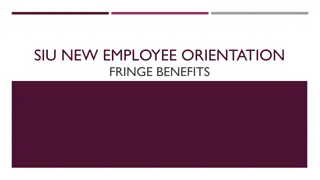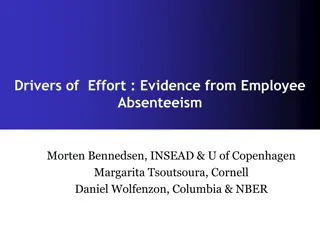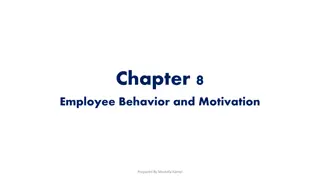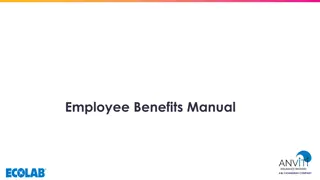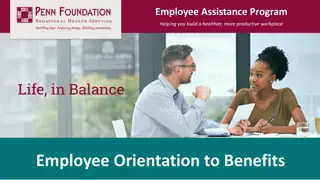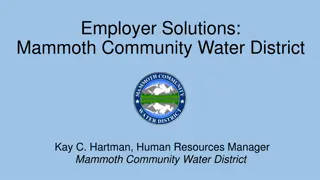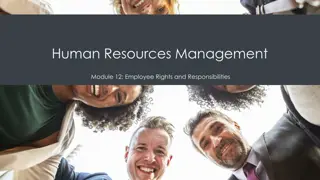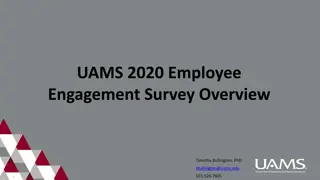Comprehensive Guide to Effective Employee Handbooks and Policies
This comprehensive guide discusses the importance of employee handbooks, the key policies to include, recent legal developments, and tips to stay compliant with EEOC regulations. It emphasizes the purpose, content, and benefits of employee handbooks, including setting expectations, managing employees, and creating a professional work environment. The guide also covers at-will employment, personal introductions, and the significance of clear policies in maintaining a harmonious workplace.
Download Presentation

Please find below an Image/Link to download the presentation.
The content on the website is provided AS IS for your information and personal use only. It may not be sold, licensed, or shared on other websites without obtaining consent from the author.If you encounter any issues during the download, it is possible that the publisher has removed the file from their server.
You are allowed to download the files provided on this website for personal or commercial use, subject to the condition that they are used lawfully. All files are the property of their respective owners.
The content on the website is provided AS IS for your information and personal use only. It may not be sold, licensed, or shared on other websites without obtaining consent from the author.
E N D
Presentation Transcript
Effective Policies and Employee Handbooks Lauren Nations Ariel Harris March 21, 2019
To Be Discussed I. Particular policies that should be included in your employee handbook. II. Particular aspects of certain policies that you should be aware of, including recent developments in the law. 2
Why Should We Care? In 2018, filings with the EEOC are up more than ever: oEEOC filed 220 actions 200 merit lawsuits 20 subpoena enforcement actions o16 by Charlotte office (covering VA, NC, and most of SC) oCases filed by statute include: 111 Title VII, including 82 sex/pregnancy, 43 retaliation and 19 race 85 ADA
Why Should We Care? Your policies can help you stay off the EEOC s (and plaintiff scounsel s) radar: oClarify inappropriate conduct oEmphasize non-retaliation provisions oEmphasize commitment to being a zerotolerance workplace oEnsure multiple, wide-open reporting channels and robust response protocols
Purpose of Employee Handbooks Sets forth the expectations for employees and provides implementation uniformity. Provides procedures and guidelines for supervisors when managing employees. Establishes a professional and cohesive environment. A great tool if company must defend against a litigation.
Personal Introduction Positive and uplifting welcome message Encourage open and honest communication Policies will change from time to time oWithout notice? Supersedes all prior written or oral guidance
At-will Employment NLRB Advice Memorandum 10/13/12 found caf s policy did not violate NLRA: The relationship between you and [Company] is referred to as employment at will. This means that your employment can be terminated at any time for any reason, with or without cause, with or without notice, by you or the Company. No representative of the Company has authority to enter into any agreement contrary to the foregoing employment at will relationship. Nothing contained in this handbook creates an express or implied contract of employment.
EEO Policy Anti-discrimination policy: oRace, color, religion, gender, age, national origin, disability, veteran status oSexual orientation/gender identification? EEOC: both are protected; DOJ: neither are protected Circuit split: will Supreme Court hear? 2nd and 7th: sexual orientation is protected 11th Circuit: gender nonconformity is protected but sexual orientation is not 5th Circuit: sexual orientation is not protected 6th Circuit: gender identity is protected o Or any other legally protected status
Anti-Harassment Policy Include application to vendors and clients who interact with Company personnel May consider including a non-exhaustive list of examples of sexual harassment. Clarify that all employees (particularly managers and supervisors have a responsibility for keeping the work environment free of harassment. Describe complaint procedure: o Designate someone or use a hotline Provide alternative when designated person is the alleged harasser
Internal Investigations - Confidentiality Cannot maintain blanket rule regarding confidentiality of investigations but must demonstrate confidentiality need on a case-by-case basis. NLRB Advice Memorandum 1/13/13: sample policy: The Company has a compelling interest in protecting the integrity of its investigations. In every investigation, the Company has a strong desire to protect witnesses, to keep evidence from being destroyed, to ensure that testimony is not fabricated, and to prevent a cover-up. [Company] may decide in some circumstances that in order to achieve these objectives, we must maintain the investigation and our role in it in strict confidence. If [Company] reasonably imposes such a requirement and an employee does not maintain such confidentiality, the employee may be subject to disciplinary action up to and including immediate termination.
Anti-Retaliation/Whistleblower Policy Protected from retaliation only if alleged unlawful activity, policy, or practice is brought to the Company s attention: [Company] will not retaliate against an employee who in good faith, has made a protest or raised a complaint against some practice of [Company], or of another individual [Company] has a business relationship, on the basis of a reasonable belief that the practice is in law, or a clear mandate of public policy. or entity with whom violation of The company will investigate any complaint and will take immediate and appropriate disciplinary action if needed.
Code of Conduct Address broad issues such as appropriate behavior while at work, workplace violence, dress code, and solicitation Using business equipment precludes any claim of privacy; reserve right to review email, voicemail, computer use, or Internet use by employee who uses your equipment, and make clear that certain activities are prohibited
Discipline Policy Do not use language that could imply progressive discipline (or every stage of it) will be used every time: The Company, in its sole discretion, will determine when to warn, reprimand, place on probation, terminate, or otherwise discipline employees in the manner and degree appropriate. Generally, the following progressive steps will apply to discipline cases, although the Company may begin the discipline process at any step or advance to any step, including immediate termination or termination after any step of the process the Company deems
Drug Testing Policy Discussed on prior NCMS webinar in December 2018 Prohibit the use, sale or purchase of drugs, alcohol, or other intoxicants, and their possession, as well as possession of related paraphernalia. Clearly state in writing that workers are subject to discipline or discharge if they are under the influence of drugs or alcohol during work time. State that the employee s privacy will be respected in providing samples, and the results of test are confidential.
Drug Testing Policy When to Test: Specify the circumstances under which employees are required to undergo testing. Specify if you will implement a random testing policy, or if employees who have violated the company drug policy to undergo random drug tests in the future. State whether it takes only one supervisor or several managers plus the HR department to decide to require the employee to take a medical test.
HIPAA Definitions Selected Definitions (45 CFR 160 & 164): Covered entity means: (1) A health plan. (2) A health care clearinghouse. (3) A health care provider who transmits any health information in electronic form in connection with a transaction covered by this subchapter. Covered functions means those functions of a covered entity the performance of which makes the entity a health plan, health care provider, or health care clearinghouse. Disclosuremeans the release, transfer, provision of access to, or divulging in any manner of information outside the entity holding the information. 19
HIPAA healthcare providers HIPAA requires employees and agents of companies to protect the confidentiality and integrity of medical information. Client and/or employee protected health information (PHI) will be considered confidential, and may not be used or disclosed except to authorized users for approved purposes. HIPAA also requires that covered entities have and apply appropriate sanctions against members of their workforce who fail to comply with HIPAA requirements. Disciplinary measures should be determined on a case by case basis, but remain consistent with HIPAA policies and procedures. Employees should understand that disciplinary actions include termination.
Violations Include Violations of the HIPAA Privacy include, but are not limited to: 1. Accessing PHI data that is not needed in order to perform work functions; 2. Unauthorized disclosure or use of PHI, including discussing confidential information with an unauthorized individual and copying PHI without authorization; 3. Unpermitted use of another person s computer access in order to obtain PHI; 4. Obtaining PHI under false pretenses; and 5. Using, retaining and/or disclosing PHI for commercial gain, advantage or malicious harm. 21
North Carolina Laws North Carolina law sets standards for records held by doctors, hospitals and other health care providers within the state. Most health care providers must follow both the HIPAA Privacy Rule and North Carolina law. Public access to government agency records, generally governed by N.C.G.S. 132-1. Confidentiality of records maintained by local health departments, generally governed by N.C.G.S. 130A-12. Confidentiality of individually identifiable information and records regarding communicable disease governed by 130A- 143. 22
Wages 23
Employee Classification Exempt or non-exempt Non-exempt employees entitled to 1.5x s regular hourly rate for all time over 40 hours per week oBased on number of hours worked, not number of hours paid (e.g., paid vacation) Not permitted to work overtime without supervisor permission or off the clock oIf they do, will be compensated, but subject to discipline
Employee Classification Exempt employees oDuties test oSalary or fee basis requirement 3/7/19: DOL proposed rule to increase annual minimum salary requirements from $455 per week ($23,660 annually) to $679 per week ($35,308 annually)
Wage Deductions - NC Under North Carolina Wage and Hour Act, N.C.G.S. 95-25.8 et seq. an employer may withhold or divert any portion of an employee's wages when: The employer is required by State or federal law; The amount or rate of the proposed deduction is known and agreed upon in advance and under certain requirements; The amount of the proposed deduction is not known and agreed upon in advance and under certain requirements; The wages are owed for the employer s benefit and under certain requirements; For cash shortages, inventory shortages, or loss or damage to an employer s property; For overpayment of wages to an employee as a result of a miscalculation or other bona fide error, advances of wages to an employee or to a third party at the employee s request; and Criminal process has issued against an employee, an employee has been indicted, or an employee has been arrested for a charge incident to a cash shortage, inventory shortage, or damage to an employer s property.
Vacation Leave In North Carolina, employers are not required to provide employees with vacation benefits, either paid or unpaid. If an employer chooses to provide such benefits, it must comply with the terms of its established policy or employment contract. See N.C.G.S. 95-25.2(16). If an employer establishes a vacation policy, the policy must address: a) How and when vacation is earned; b) Whether or not vacation time can be carried forward from one year to another (and what amount may be carried over); c) If there are times that vacation time must be taken, when; d) Whether vacation pay may be paid in lieu of time off; and e) The conditions by which vacation pay will be forfeited by any interruption of employment (for any reason).
Holiday Leave North Carolina law does not require private employers to provide employees with either paid or unpaid holiday leave. In North Carolina, a private employer can require an employee to work holidays. A private employer does not have to pay an employee premium pay (time and a half), unless the time worked qualifies the employee for overtime under standard overtime laws. North Carolina state entities observe the following holidays: a) b) c) d) e) f) g) h) i) j) New Year s Day (January 1) Martin Luther King s Birthday (3rd Monday in January) Good Friday (usually falls in March or April) Memorial Day (last Monday in May) Independence Day (July 4) Labor Day (1st Monday in September) Columbus Day (2nd Monday in October) Veterans Day (November 11) Thanksgiving Day (4th Thursday in November) Christmas Day (December 25) 29
FMLA Leave 12 workweeks of unpaid, job-protected leave (26 for FMLA leave taken to care for covered servicemember) Indicate whether PTO will accrue and holidays will be paid Indicate whether it will run concurrently with paid leaves If require Fitness for Duty test prior to return, it must be noted in handbook
Accommodating Persons with Disabilities 31
Reasonable Accommodations Restate equal opportunity/non-discrimination Inform that, if because of a physical or mental disability, you need an accommodation to enable you to perform the essential functions of your job, to please notify your supervisor or HR so that together we can discuss your situation and how we may be able to help oUp to the employee to request oReasonable accommodation
National Labor Relations Act It s not just for unionized workplaces Concerted activities for mutual aid or protection (NLRA Sec. 7) Validity of employment policy turns on whether such policy would reasonably tend to chill employees in the exercise of Section 7 rights
National Labor Relations Act If policy explicitly restricts activities protected by Section 7, it will be considered unlawful If policy does not explicitly restrict Section 7 activities, will still be unlawful if: oCould be reasonably construed to prohibit Section 7 activity oWas promulgated in response to protected activity oHas been applied to restrict the exercise of Section 7 rights Discriminatory application
Non-Solicitation Policy May prohibit solicitation and distribution of literature during work time and in working areas oBreak periods/meal times generally not working time oWorking areas: all employer facilities except break/lunch rooms and parking areas
Bulletin Board Policy May restrict bulletin boards for business only May limit personal postings to specific, defined categories and not for organizations and groups, provided that the distinction is consistently enforced oE.g., for-sale notices ok, but not solicitations for a church, club or other organization
Employee use of Employers Equipment/Media Clearly state that these systems are employer s property and are intended for business use, while acknowledging the reality that these systems are available for occasional personal use not including solicitation of any kind provided it does not interfere with work responsibilities and business operations.
Confidentiality Policy Many employers have a policy prohibiting employees from discussing or disclosing confidential information, and include compensation and performance appraisals BUT you cannot discourage or prohibit employees from discussing wages, hours or work conditions violates Section 7 and may be illegal on its face.
Social media Blogging, social media, and internet posting policies are often overly broad: prohibiting employees from making disparaging remarks about the company or depicting the company in any way over the internet without company permission allegedly interferes with employee rights to engage in protected concerted activity. Tips: o Prohibit sharing of trade secrets and employee contact information o Require those who identify as Company employees in the post to state explicitly and prominently that views expressed are their own and not those of Company o Reserve the right to monitor posts/comments about the Company and its representatives, customers, vendors, other employees, business, products, or competitors o No expectation of privacy while using Company equipment
Handbook Acknowledgement Employee has read and received a copy of the handbook, understands all of the rules, and agrees to abide by them Nothing intended to alter at-will employment relationship Company has right to interpret, modify, revoke, or suspend any or all of its policies and procedures at any time Sign and date and preserve in personnel file
Presenters Lauren Nations Ariel Harris Of Counsel Associate Atlantic Station 201 17th Street NW Suite 1700 Atlanta, GA 30363 One Wells Fargo Center 23rd Floor 301 South College Street Charlotte, NC 28202 T 404.322.6501 Email: lauren.nations@nelsonmullins.com T 704.417.3121 Email: ariel.harris@nelsonmullins.com 43
